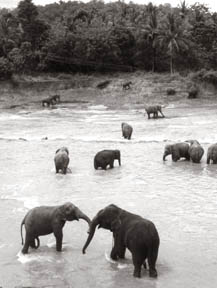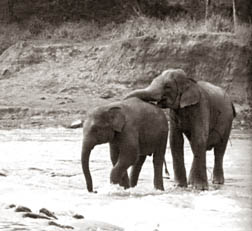|
observer |
|
|
|
|
|
OTHER LINKS |

|

|

|
An auspicious occasionI am at the Pinnawela Elephant Orphanage in Sri Lanka fulfilling the
ambition of a lifetime. At 24 square acres, it is one of the largest
orphanages in the world. The first thing that strikes me - much to my
delight - is the amount of freedom the
Another striking aspect of the orphanage is the way the mahouts are able to control the elephants so easily and flawlessly. After a few minutes, the mahouts announce that the guests should get inside the large enclosed area. Once everyone is safely behind the wooden fences, the elephants are all herded 400 metres to the Maha Oya River for their baths. Only when they are safely at the river we are allowed to follow. At Pinnawela it is the humans - not the animals - who are kept behind bars! Bathing lasts two hours, from 10-12 and 2-4 pm. Here also, the elephants are allowed to roam as they please, choosing to romp in the river, or paint themselves with mud on the far bank. This is another good opportunity to interact, visitors are allowed as close as they like and there are many fantastic photo opportunities. I watch in awe as the elephants spray themselves with water. During this time the male elephants remain separate and are bathed by their mahouts. The mahouts have an intimate understanding of their individual elephants and develop a bond of trust and affection that allows them to control the elephants with simple verbal commands and touch alone. Bathing is a time to bond, and is pleasant for both overheated jumbos and mahouts. After bathing, the elephants return to their pasture. They pass so close I am able to stroke them, unable to resist fondling their beautiful ears. I go for lunch, returning in time to watch the baby being fed. He is waiting in an enclosure with three large females. The elephants are all fed giant bottles of milk, three or four each. The baby bellows his impatience as he waits to be fed, playing to the crowd who has come to watch. The experience is very endearing and even the toughest of men coo as they watch the baby suckle the bottle. The orphanage was established by the Department of Wildlife in 1975 on a 25 acre coconut plantation. There were just 7 orphan elephants at that time. The orphanage was designed to care for baby elephants found in the jungle with no mothers.
The rest of Pinnawela's residents are rescued babies such as poor Sama. She had the bottom 6 inches of her leg blown off by a landmine in Northern Sri Lanka. Left in the wild she would probably have died, but now lives quite comfortably. The orphanage's success lies in its ability to simulate wild conditions whilst remaining in control. A herd structure has been established and the elephants romp together freely. The elephants' diet consists of coconut leaves, jackfruit branches and branches from the kitul palm tree. The gigantic jumbos put away a staggering 70 kg of leaves a day. In addition to this, they are fed 2 kg of dry mixture, consisting of maize, rice, bran and powdered gingili seeds. Elephants spend up to 20 hours a day eating and consume 100 litres of water. Maintaining their massive bulk is clearly a fulltime job. Although the world is becoming wise to the need to preserve its elephant population, there are still many risks. Elephants are hunted for both their ivory and their meat, and also face the dangers posed by diminishing land. In 2003 there were estimated to be less than 30,000 Asian elephants, half of those residing in India. The remaining 15,000 are spread between Sri Lanka, Bangladesh, Bhutan, Cambodia, China, Indonesia, Laos, Malaysia, Myanmar, Nepal, Thailand and Vietnam. This is why places like Pinnawela are so important. It takes a pregnant elephant 22 months before she is ready to give birth, and she is only able to have a maximum of four babies during her lifetime, so numbers are slow to rise. As well as the mahouts, the orphanage relies on the contribution of volunteers who come from all over the world to interact with the elephants. They help with the day-to-day aspects of running the orphanage, such as bathing, feeding and mucking out. Most people volunteer for a month and live together in a nice guesthouse in the nearby village of Kegalle. To get involved visit www.travellersworldwide.com . Kirsty Turner
|
 elephants have. Apart from the
few working males, the 65 elephants roam freely. Of course, there are
mahouts (keepers) present to keep an eye on things, but visitors are
free to interact with the elephants.
elephants have. Apart from the
few working males, the 65 elephants roam freely. Of course, there are
mahouts (keepers) present to keep an eye on things, but visitors are
free to interact with the elephants.  Usually, the mothers had been shot by poachers for their meat. The
orphanage has come a long way since then. In 1978, the orphanage was
taken over by the National Zoological Gardens and a captive breeding
program was launched in 1982. In just three decades the number of
elephants has risen to 65, with 23 babies bred on site.
Usually, the mothers had been shot by poachers for their meat. The
orphanage has come a long way since then. In 1978, the orphanage was
taken over by the National Zoological Gardens and a captive breeding
program was launched in 1982. In just three decades the number of
elephants has risen to 65, with 23 babies bred on site. 







